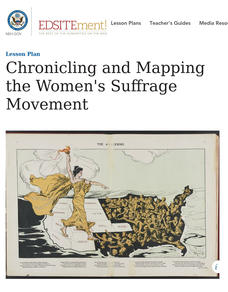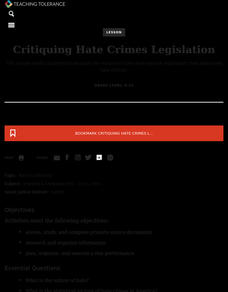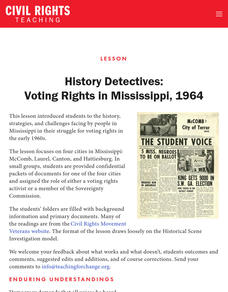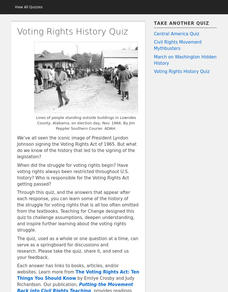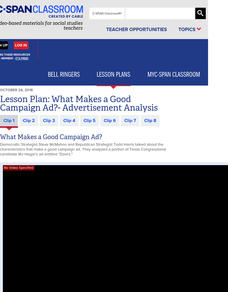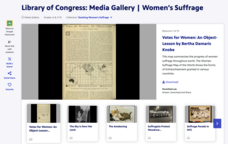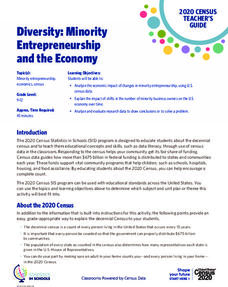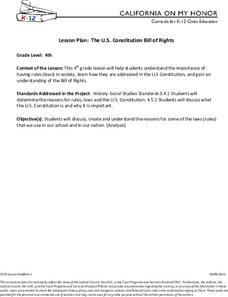National Endowment for the Humanities
Analyzing “Intercepted Intelligence”
A good diplomat needs to know how world events can affect their country. First, class members examine the Papal Bull that excommunicated Queen Elizabeth I from the Roman Catholic Church. Then, learners playing the role of diplomat from...
National Endowment for the Humanities
The Power of the Majority over Thought
While Alexis de Tocqueville mourned a lack of "freedom of discussion" in America in the early republic, today's pupils are concerned about peer pressure. Using excerpts of de Tocqueville's writing and discussion questions, scholars...
National Endowment for the Humanities
The Tyranny of the Majority
In American democracy, majority rules but what prevents the voices of the few from being crushed? Using excerpts from Alexis de Tocqueville's writings, young historians explore cases where minority rights were trampled upon. Extension...
National Endowment for the Humanities
The Omnipotence of the Majority
While the American system is based on the idea of almost-universal suffrage for adults, great thinkers have had concerns about this system of governance. Using classic writings from Alexis de Tocqueville and videos highlighting thinkers...
National Endowment for the Humanities
Chronicling and Mapping the Women's Suffrage Movement
While women's suffrage is often believed to be the result of a single constitutional amendment, the effort of women to secure the vote spanned decades and continents. Using primary sources in online archives, class members explore the...
Teaching Tolerance
Critiquing Hate Crimes Legislation
The high school lesson explores what hate crimes are and how the government has responded to those crimes. Academics read legislation, analyze political cartoons, and complete hands-on-activities to understand what motivates individuals...
Teaching for Change
History Detectives: Voting Rights in Mississippi, 1964
Promises made and promise broken. Spies and activists. Voting rights in Mississippi are the focus of a lesson that has class members research the history of the struggle in Mississippi. Learners take on the role of voting rights...
Teaching for Change
Voting Rights History Quiz
An 11-question online quiz permits young historians to check their knowledge of the history of voting rights in the United States. After reading a short introduction, individuals click through the questions that test their knowledge of...
Facing History and Ourselves
The Legacies of Reconstruction
The final instructional activity in the seven-resource Reconstruction Era collection examines the legacies of Reconstruction. Class members investigate why the period has been called an "unfinished revolution," "a splendid failure," and...
Facing History and Ourselves
Interracial Democracy
Radical Reconstruction, the 10-year period referred to after Congress passed the Reconstruction Act of 1867, saw the establishment of manhood suffrage, men voting without any racial qualifications. Southern states also rewrote their...
Facing History and Ourselves
The World the War Made
The United States Civil War forced Northern and Southern societies, as well as the people who made up those societies, to reconstruct their vision of themselves and their identities. A series of video-based web lessons look at the great...
National Endowment for the Humanities
A Day for the Constitution
The "Constitution Day and Citizenship Day" law requires schools receiving any federal funding to provide educational programming on the history of the American Constitution. The lesson plans, materials, videos, questions, and activities...
C-SPAN
What Makes a Good Campaign Ad?- Advertisement Analysis
In the time of a hotly contested presidential election, campaign ads are almost ubiquitous—but what makes them good? Using ads from the 2018 midterm elections, learners consider the various strategies candidates use to get the vote....
Teaching for Change
Selma in Pictures: Socratic Seminar
Photographs from the freedom movement in Selma, Alabama serve as the basis of two Socratic Seminars. Class members prepare for the seminars by closely observing the images, form a hypothesis, and use evidence from photo to support a...
C-SPAN
Primary and Secondary Sources: Trailblazers in Congress
Trailblazers forge the path into uncharted territory, they establish a precedent for others to follow. Young historians research trailblazers in Congress using primary and secondary sources to profile outliers that changed the face of...
Maryland Department of Education
Our Children Can Soar
Amazing efforts of African American leaders are celebrated in a instructional activity on civil participation. The engaging resource focuses on primary and secondary sources to analyze the impact of African American leaders such as Ella...
PBS
Library of Congress: Media Gallery | Women's Suffrage
Designed to support a study of women's suffrage in the United States, a primary source document set from the Library of Congress includes images, song sheets, articles, statistical documents, political cartoon, and audio recordings...
Encyclopedia Britannica
Candidate Position Research
As part of their study of the US Presidential election process, class members research a presidential candidate's position on a specific topic or topics. Formatting their research as a pro/con question ("Should the Death Penalty Be...
Constitutional Rights Foundation
What Is Constitutional Democracy?
Rediscover the values at the heart of American democracy and what makes it unique with your pupils. Use a reading and discussion questions—in addition to an analytical activity—on the preamble to the Constitution. An additional activity...
US Department of Commerce
The Census Questionnaire: Then and Now
As the United States has changed, so has the census! While required by the Constitution, the questions the government asks to allot representation and federal funding has developed over time. Using images of previous censuses, young...
US Department of Commerce
Featured Activity: Exploring Questions for the 2020 Census
Just what is the census for? Using data and census questions, class members explore how officials gather information. Then, they consider how the government uses the answers to determine how it spends its money with a collaborative...
US Department of Commerce
Featured Activity: How the Census Impacts My Community
Individuals have $50,000 to spend on a program at their schools—what will they do with the money? After looking at the Constitutional mandate, learners use a census simulation activity to consider the question. After conducting their own...
US Department of Commerce
Diversity: Minority Entrepreneurship and the Economy
Using data from the Census Bureau, learners discover the growth in minority-owned businesses over time. After crunching numbers, analytical questions probe the reasons behind the shift.
Judicial Branch of California
The U.S. Constitution Bill of Rights
Using discussion questions and a poster-creating activity, learners explore how the framework of the Constitution and its Bill of Rights help create safe communities. After listening to a song about the preamble and reading the Bill of...




